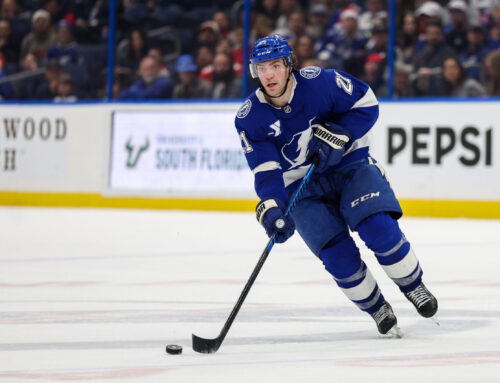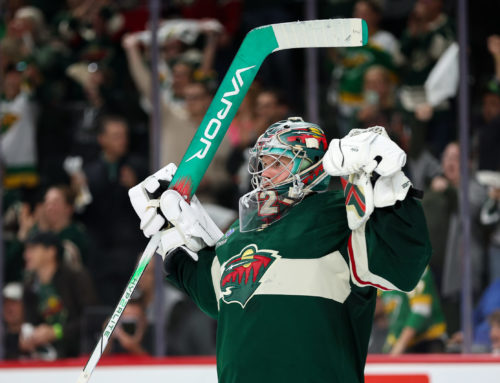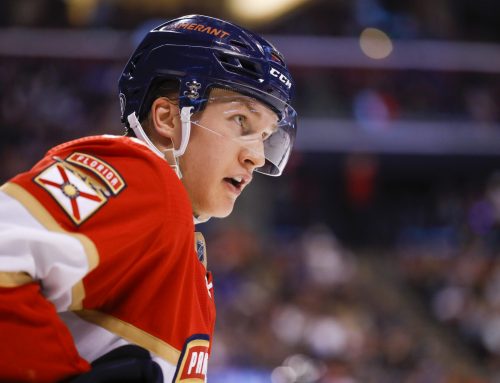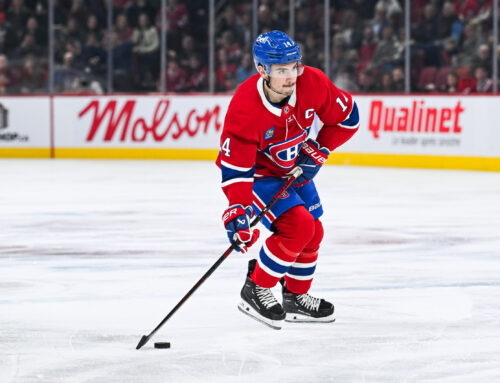
On Monday forum member mvp0207 asked the question: Myers or Kulikov? As I was diving in to answer his question I realized that this would make for the perfect Cage Match. His league has the standard 6×4 H2H rotisserie format and while it is a one year league I will answer his question for both the one year and keeper scope. You ready? Let's do this.
At only 21 years old both Tyler Myers and Dmitri Kulikov are already NHL veterans playing in their third NHL season. This is common place in the salary cap era as youngsters, even young defensemen, are pressed into action sooner. This trend has forced us to change the way we view the development of defensemen.
Traditionally defensemen have taken years to develop into stars. A classic model is Chris Pronger, who was selected second overall in 1993 . Pronger made the leap straight from the draft to the NHL, which was itself a minor miracle for that day and age, but it took until Pronger's sixth season, when he was 24 years old, before he scored even 40 points. Today it is no longer unusual for a defenseman to jump straight from the draft to the NHL and the expectations among teams, fans and poolies alike is to see production right away because if your young defenseman isn't producing chances are someone else's is. Myers and Kulikov offer us two different perspectives on how poolies need to approach these young defensemen.
Myers is the obvious answer to mvp0207's question. One need only compare their stats from the last two years and see that Myers has absolutely been the better own so far but it never is quite that simple. When players are so young one must be patient when considering their future and allow time for all the development and circumstantial opportunities to sort themselves out.
So far Myers has had an extreme advantage both developmentally and circumstantially. While both Kulikov and Myers were born in 1990, Myers was born in early February and Kulikov in late October. This means Kulikov has more in common, developmentally, with a player born in 1991 and this is reflected in the fact that Kulikov was drafted a year later than Myers. Essentially Myers has had an extra year of growth and development and that is compounded by the fact that Kulikov is an import and only got one year of play in the CHL before making the leap to the NHL. Myers, on the other hand, played three full seasons of major junior hockey before making his NHL debut. So while they both debuted in 2009-10, Myers was already light years ahead of Kulikov.
What's more, Myers received pro style coaching for each of his three years of major junior, playing for the NHL defenseman factory known as the Kelowna Rockets. The Rockets franchise is only 16 years old but it has developed quite the reputation for preparing its players for the rigors of the NHL. Their alumni include Shea Weber, Duncan Keith, Luke Schenn and many more NHL defensemen. Myers could not have picked a better junior team if he'd had a choice.
Then we have to factor in their pro teams. Myers was not only drafted to a quality franchise that made the playoffs in both of his first two years he was also given every opportunity to succeed. While Myers' combination of size, skating and puck moving ability was out of this world no matter which team he played for, it certainly helped that the Sabres were lacking all three. Not since Brian Campbell left had the Sabres had a defenseman with Myers elite skating and puck moving skills and the only time they'd ever glimpsed someone taller than six foot was when they looked at their opponents, or the crowd, or walked down the street. Myers' size was a more than welcome addition to the team but it was really his puck moving and skating skills that allowed Myers to become a major fantasy asset so quickly.
Devoid of any other real options the Sabres handed the keys to their power play over to Myers right from the get go. Myers led all Sabres in ice time with over 23 minutes a night and all defensemen in power play ice time, with just under three minutes a night, during his rookie season, often as the lone defenseman on the top power play unit. The Sabres power play was only middle of the pack (17th in the league) but their overall team scoring was among the top 10 (exactly 10th actually). Big minutes and top unit power play time go a long way, no matter what team you play for but Myers' team was above average and so was his opportunity.
It was more of the same for Myers in his sophomore season. The Sabres power play was improved (ninth in the league) and their overall scoring remained top 10 (ninth as well) putting Myers in a great position to succeed. He was second on the team in ice time with over 22 minutes per game and once again led all Sabres defensemen in power play time. It is worth noting that free agent acquisition Jordan Leopold is the player who took over Myers' ice time lead and also nearly tied Myers for power play ice time. This, along with the fact that Myers may have been a little bit lucky during his rookie season can help account for Myers' decline to his disappointing sophomore year. (Disappointing is of course a relative term)
Kulikov, as is becoming the trend, had it much harder once he arrived. The Panthers have been a horrific franchise, having not made the playoffs in over a decade. In Kulikov's rookie season they had the league's third worst offense and second worst power play. His sophomore season was no better. Their offense improved one spot to 27th but their power play fell one spot to dead last.
Even if Kulikov received the type of minutes Myers had, he still would have been in tough to match Myers' production. Kulikov, of course, did not receive Myers-like minutes and so it was almost inevitable that Myers would out-produce him. Kulikov averaged just shy of 18 minutes a game for the Panthers in his rookie season, 2:47 of those came on the power play. In his sophomore season Kulikov's ice time was up to just shy of 20 minutes a game while his power play time dropped to 2:36 per game.
By his sophomore season Kulikov's ice time was almost comparable but still short of Myers' but there is more. Kulikov never got much of an opportunity to skate with the top power play unit in Florida. He was always second on the depth chart to veteran defenseman Bryan McCabe. It's tough enough to produce on a talent and scoring deprived team as it is, but when you are in turn deprived of playing with the limited number of skilled players on the team you are fighting a losing battle. Kulikov's 16-point rookie season and 26-point sophomore season are remarkable when you consider he was just 19 and 20 years old when he recorded those respective totals. And while they show healthy improvement from year to year, they are still drastically low in comparison to Myers and that's all that really counts for poolies.
To put this all another way, to this point Myers has essentially been the trust fund baby whose parents put him into private school, paid for his college, bought him a car and scored him a job. He's had literally every advantage over Kulikov who, in this example, is the stereotypical poor kid who has had scrape his way from the bottom. It truly can be a cruel world but time is the great equalizer for prospects. Time gives the smaller, the weaker and the younger a chance to grow.
That is exactly what has happened to the Myers-Kulikov Cage Match. Time hasn't just thinned out the margins here – it has flipped them entirely on their heads. Time has allowed for the development of new opportunities. Some doors have opened and other doors have closed. Over the summer a lot of doors were opened and shut in Florida and Buffalo.
The Sabres got themselves a new owner, Terry Pegula, who spent the summer making it rain like he was Pacman Jones. His spending spree scored Myers a fat new contract but it also cost him his peachy spot as top dog on the Sabres blueline. Frozenpool's line combinations tool shows us that Myers is no longer the golden child in Buffalo.

Instead Myers has been relegated to second unit duties alongside Leopold. Prized free agent signee Christian Ehrhoff and playoff hero Marc-Andre Gragnani are now the big men on campus. Myers' power play ice time has now fallen to just under two minutes per game and the Sabres blueline depth is also costing him overall ice time. He sees just 21:28 per game, which is still good for second on the team but clearly the lowest he's averaged in his career.
Myers is being used in predominantly a shutdown role. This is what poolies feared most about Myers when he was first drafted. No one really expected Myers' rookie exploits but once they came everyone took for granted how lucky it was.
Myers' true calling has always been to be that shutdown defenseman. While his offensive prowess and instincts are quite good his skills better lend themselves to the defensive end. His long reach and smooth skating stride are simply better utilized matching up against the other teams' best players. In this sense he is a lot, if not exactly, like Calgary defenseman Jay Bouwmeester.
For years Bouwmeester racked up solid point totals despite never really being a true offensive defenseman. This was because he played in Florida. There were no better options so Bouwmeester got all the offensive minutes he could handle. When he signed as a free agent in Calgary he got paired up with Robyn Regehr and assumed his proper role as a shutdown guy. Poolies have avoided him ever since.
Can you guess who Myers' partner is this season? If you can't, Frozenpool has the answer:

That's right, it's Robyn Regehr! Buffalo liked what he did to Bouwmeester so much they decided they just had to have him. Now Myers on pace for very Bouwmeester-esque 24 points. That's un-ownable in just about any fantasy league. It is a small sample size (10 games) but the ice time stats speak volumes about how much has been taken away from Myers. Now I know you Myers owners are in denial so allow me to pile on.
Myers and Regehr are gobbling up penalty kill minutes (over three minutes per game for each of them) and thanks to Behindthenet we can see that Myers and Regehr also receive the fewest offensive zone starts of all Buffalo defensemen. They are most definitely the shutdown pairing and it is time to start getting worried. After all, Bouwmeester didn't stop receiving power play time when he went to Calgary either. He just stopped receiving top unit power play time because he was being used in another role. You could say he came down with a bad case of "The Scourge of Robyn Regehr" and it looks like Myers has now caught it.
Now consider what happened in Florida this summer. If Buffalo's off-season moves were the absolute worst case scenario for Myers then Florida's off-season moves have been the absolute best for Kulikov. First of all, McCabe was traded away at last year's trade deadline. This resulted in an immediate spike in Kulikov's ice time and his seven points over those final 21 (McCabe free) games made for one of the best stretches of his young career. Then this offseason the Panthers hired a new coach, Kevin Dineen, who boasts a very solid run coaching the Portland Pirates of the AHL over the last six years. Finally, Panthers GM Dale Tallon went out on a spending spree that you just know Terry Pegula was jealous of. Tallon handed out four year deals like hand jobs in a back alley and that was just to get to the cap floor! The end result being that Florida is, at least for now, a much improved team.
Of Tallon's acquisitions, veteran defenseman Brian Campbell is the most interesting. While Kulikov may have at first been thinking, "Oh here we go again," but Campbell's game is much more similar to Kulikov's than McCabe's was so he offers a much better model to learn from. Furthermore, the Panthers bringing in a new coach has meant a deviation from their old single defenseman power play schemes that left Kulikov out in the cold. As Frozenpool will show us, Kulikov and Campbell have actually been paired together making them the number one pairing on Florida's power play.

Kulikov is now playing well over four minutes a night on the power play and seeing over 22 minutes per game in overall ice time. That's certainly the most Kulikov has seen in his career and is even better than what Myers received in his first two years in Buffalo.
As mentioned earlier, the off-season additions have also made Florida a much more prolific team. Their offense is only middle of the pack (16th in the league) but their power play is top five (fifth exactly). This is also a vast improvement over their dreadful scoring and power play performances of the previous two seasons. Even if they do decline (and they should, they really, really, really should) their scoring and power play numbers will still be the best of Kulikov's tenure in Florida thus making his environment much more agreeable.
All these changes are working wonders for Kulikov. He has seven points (three on the power play) through the first eleven games of the season. That all his points are assists is mildly disconcerting but over half (4) have been primary assists so it's not as though he's snaking out a bunch of secondary assists and misleading us with an early pace that he cannot maintain. His current pace is for 52 points and while that is a little high Kulikov is certainly capable of topping 40 this year. With all the experience he gained in his first two seasons and the bounties of this new opportunity it is safe to say Kulikov is ready to breakout.
The only real question mark with Kulikov is durability. He has averaged only 70 games through his first two years in the league and when you consider his slight build he seems a good bet to miss some time. With a bit of luck though, Kulikov will pot 40 in 70 games.
Of course, points are not the only part of the equation but neither Kulikov nor Myers are big PIM producers (both averaging around 40 PIM a year). Furthermore, neither one is an extreme outliers when it comes to Plus/Minus (although Myers is admittedly better if for no other reason than the fact his team is better). Neither one is a big shooter but Myers, in his reduced role, will be shooting less, while Kulikov, in his increased role, will be shooting more (and already is with 20 SOG through the first 11 games) so score that category to Kulikov. We've already covered points, with Kulikov gaining a serious advantage, although it's worth mentioning that Myers should hold the goals advantage for the next couple years while Kulikov learns to use his shot more effectively. This gives Kulikov assists, PPP and SOG, with Myers holding down Plus/Minus (maybe) and goals (for now). The tables have clearly turned and the time to run out and grab Kulikov is now. In fact, maybe you'll want to sell Bouwmeester… err… I mean Myers while you still can.
This goes for both one year and keeper leagues. The gap will only get bigger. If you asked anyone, before Myers' explosive rookie season, who the better offensive prospect was they'd have told you it was Kulikov, hands down. He has been compared to former star defenseman and fellow Russian, Sergei Goncher, by many different people and that's the upside you are looking at with Kulikov. Myers, meanwhile, well he's a Jay Bouwmeester clone or at most a slightly more offensively inclined Jay Bouwmeester. Hand Kulikov the belt and a stool he can climb up on. He is head and shoulders above Myers and the clear winner of this Cage Match. Surprisingly enough, it wasn't even close and maybe it never was. All you needed was a little patience.






 MIN
MIN MTL
MTL PHI
PHI COL
COL CHI
CHI ANA
ANA
